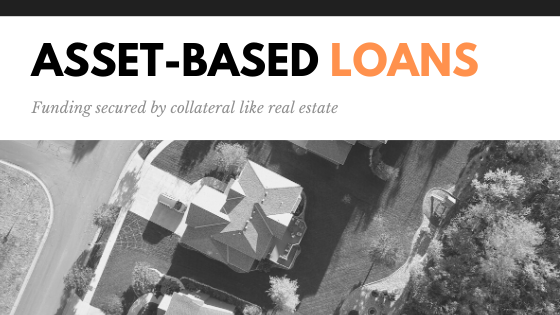If you’re interested in real estate investing, you may have heard of asset-based loans. There are many different types of real estate financing out there, designed for various investing purposes. An asset-based loan is a real estate financing option where the loan is secured by the asset, in this case, the investment property.
Asset-based lending provides real estate investors with the opportunity to raise money in a way that doesn’t involve taking out a traditional mortgage. Before applying for this type of loan, it’s key to understand the in’s and out’s and how it can affect your bottom line. Asset-based lending is not suitable for every type of real estate project, and there are decided benefits and disadvantages to this loan type that you should be aware of.
Choosing the right financing is essential to the success and longevity of not only your current investment but your future investments too. Once you’ve found a private lender that offers good terms, you can build up a long-term relationship with them and even benefit from that relationship over the course of your investing career. In residential real estate, asset-based lending is an underwriting standard in private lending. By focusing on the asset versus the borrower’s financial history and investing experience, private lenders can offer more diverse loan options than many other lenders.
This is everything you need to know about asset-based lending for residential real estate before you get started.
Table of Contents
What Is Asset-Based Lending?

Asset-based lending is the practice of loaning money in an agreement that has been secured by some form of collateral – in this case, real property. The terms of asset-based loans depend on the value of the assets that are being offered as security and the type of assets they are. In essence, you are putting future revenue on the line in order to get access to money in the present. Asset-based lenders will typically provide funds on an agreed-upon percentage of the asset’s value, typically ranging between 70 and 80%. These loans are often funded by private lenders who don’t have the same requirements that are typical with banks.
This type of lending is aimed at business purposes, not individuals borrowing to buy their primary residence. Asset-based loans are commonly used for fix and flips, where the investor purchases a rundown property, renovates it, and resells it for a profit shortly after. The borrowers that make use of this type of loan typically have their own real estate-based businesses. Securing an asset-based loan should be relatively simple if you keep a detailed financial record for your business. The information that you put forward to the lender should show that your investment has credible long-term viability, and show that you are prepared to take on a project of this magnitude.
Loans used for physical assets like real estate are considered to be riskier by lenders, which is why private lenders often require some form of down payment from the investor. You should be prepared to put down up to 20% of the value of the property in order to secure the rest of the loan amount. This gives both lender and borrower stake in the project and motivates the borrower to go above and beyond to make it successful. This is not a blanket rule however, because depending on the project and the lender you could get funding up to 100% of the property value.
Interest rates will also vary depending on the project, lender, and location. Asset-based loans in more expensive real estate locations like Massachusetts or New York will have very different rates to the same type of loan in a more affordable state like Iowa or Indiana.
How Real Estate Investors Use Asset-Based Lending

There are many different reasons for real estate investors to turn to asset-based lending over other types of financing. The investor may have limited funding options due to the type of property they are investing in, as not all lenders cater to the same types of real estate.
Investors who don’t qualify for traditional financing options can still fund deals via private lenders. This is because, in asset-based lending, the focus of the underwriting process is on the asset and not the borrower. This opens up the opportunity to invest for many individuals who may not have the option to purchase real estate otherwise.
Asset-based lending also enables investors to invest in less traditional real estate opportunities. Traditional lenders like banks have stricter lending criteria, which means they are more likely to turn down loans for investments like fix and flips. Many investors are drawn to this type of funding due to the numerous benefits that come with taking on an asset-based loan.
Advantages Of Asset-Based Lending

The first, most significant benefit of asset-based lending is speed. Asset-based lending is directly correlated to faster loan processes. This is because private lenders are not held to the same restrictions as banks and they require less documentation as a whole resulting in them granting loans much faster. Faster loan grants lead to faster closing, getting the property into your hands sooner rather than later. Real estate can be highly competitive, and getting loan approval quickly can be the deciding factor in getting your offer in first. While a traditional mortgage can take up to 90 days to be granted, an asset-based loan could be approved and granted within 7 days.
Secondly, investors with less than ideal credit history or investing experience can qualify for an asset-based loan. If your credit score isn’t high enough to meet requirements for other traditional lenders, an asset-based loan from a private lender will still be an option. Another strategy, if you have bad credit or less experience in real estate investing, is to team up with another investor that has a more appealing credit score or a few successful projects under their belt.
Asset-based lending can help investors without a lot of seed funds gain a lucrative investment using outside funds. Real estate is one of the strongest asset classes, but the barrier to entry can be high for less experienced investors. Not everyone has the funds available in order to make a large financial purchase at the drop of a hat, particularly in areas where real estate is priced highly.
Another fantastic advantage of asset-based lending is flexibility. Because private lenders are usually made up of a group of private investors, there are no set rules for how repayments have to take place. In general, private lenders are not only more flexible in their repayment terms, but they can also be more open to negotiation on interest rates and other factors of the loan.
Disadvantages Of Asset-Based Lending

The first disadvantage is that compared to traditional financing, asset-based loans can seem more expensive. Due to the risk involved in this type of loan, interest rates will be higher, and sometimes loan repayments can be higher too. Banks don’t really deal as much in asset-based loans, so you may have no choice but to opt for a private lender in this case. The lender isn’t the only one assuming risk in this type of transaction – the borrower is too. Asset-based loans are typically higher in interest but shorter in term. If the borrower doesn’t manage their finances and loan repayments well from the beginning of the project, they can quickly find themselves in financial distress.
If you are unable to repay the loan, the lender will take ownership of the asset and sell it. Your hard work done up until that point could ultimately amount to a loss if you cannot manage the property effectively. This will result in the loss of a valuable asset you could use to grow your business further or stop you from trying to invest in real estate again in the future.
Another disadvantage is that some private lenders require detailed information about the asset that will be used as collateral – sometimes this information can be a little tough to come by, or you will need to work on projections and estimates. If you’re planning on taking out an asset-based loan, you’ll need to have your ducks in a row before applying.
Choosing The Right Asset-Based Lender
Finding the right private lender for your project can be a challenge in and of itself. Not all private lenders target the same types of properties, and you’ll want to look for one that specializes in residential real estate in your area. You’ll also want to compare the services and loan offers from multiple different private lenders in order to narrow down the options to the one that is best suited to your project.
Whether you are a new residential real estate investor or a seasoned investor with several projects completed successfully, asset-based lending makes it possible for nearly anyone to get financing and invest in real estate. The caveat is that this financing is only suitable for certain types of real estate and that those types need to be managed very carefully in order to make them profitable for the investor. Interest rates on asset-based loans can range from 10-15%, with an average term of 12 months.
If traditional lending is not an option for you, asset-based lending could open up your investing potential and lower the barrier of entry that can come with investing in real estate. While this type of loan is not suitable for every project, it can be extremely valuable to the investor that needs quick financing or that is planning to make flipping houses a career.
Private lenders put more stake in the asset than in the borrower, which comes with its own set of advantages and disadvantages. As a whole, asset-based lending is a good option for borrowing for residential real estate investments. When it comes to securing a loan, make sure to carefully compare lenders to select the one that offers loan terms that work for your overall project budget and timeline. Once you build a relationship with a lender, you could secure financing not only for your current investment but also for others down the line.



